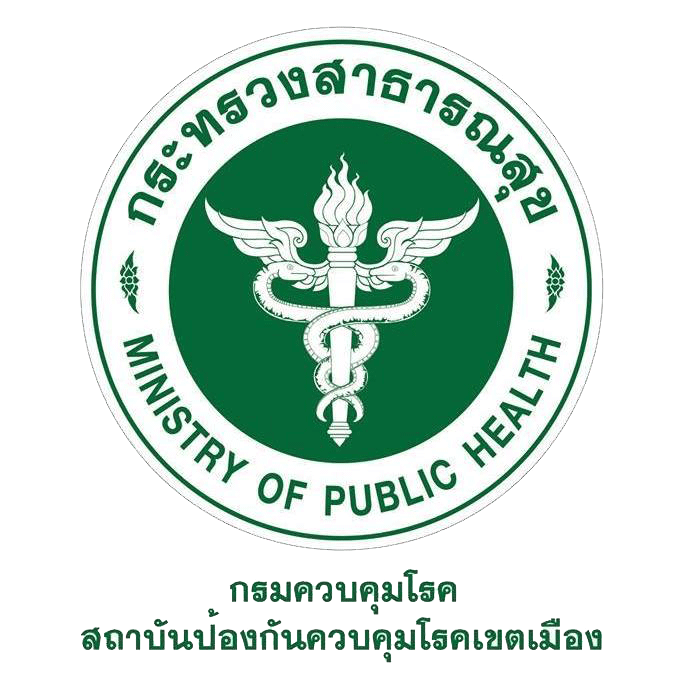มาตรฐานทางจริยธรรม
จริยธรรมการตีพิมพ์
จริยธรรมการตีพิมพ์บทความในวารสาร
วารสารสถาบันป้องกันควบคุมโรคเขตเมือง กำหนดจริยธรรมการตีพิมพ์ (Publication Ethics: https://publicationethics.org/) เพื่อการรักษามาตรฐานด้านจริยธรรมในการตีพิมพ์เผยแพร่บทความ ดังนั้นจึงกำหนดให้ผู้ที่เกี่ยวข้องปฏิบัติตามหลักการและมาตรฐานด้านจริยธรรมในการตีพิมพ์อย่างเคร่งครัด ดังนี้
จริยธรรม บทบาทและหน้าที่ของบรรณาธิการและกองบรรณาธิการ(Editor)
- บรรณาธิการและกองบรรณาธิการวารสารสถาบันป้องกันควบคุมโรคเขตเมือง มีบทบาทและหน้าที่ในการพิจารณาบทความเบื้องต้น ก่อนรับเข้าสู่กระบวนการของวารสาร ประกอบด้วย การพิจารณาเนื้อหาบทความกับกรอบของวารสาร การพิจารณารูปแบบการเขียนบทความ การพิจารณาความเข้มข้นของบทความ การลักลอกผลงานทางวิชาการ การเลือกและกำหนดผู้ทรงคุณวุฒิประเมินบทความ และพิจารณาคุณภาพโดยรวมของบทความ ก่อนเข้าสู่กระบวนการประเมินบทความต่อไป
- บรรณาธิการและกองบรรณาธิการวารสารต้องพิจารณาบทความเบื้องต้นบนพื้นฐานคุณธรรมและจริยธรรมโดยไม่เอนเอียงหรือใช้ความรู้สึกส่วนตนพิจารณาบทความนั้น ต้องไม่มีอคติต่อผู้เขียนหรือต่อหน่วยงานของผู้เขียน
- บรรณาธิการและกองบรรณาธิการวารสารต้องกำหนดหรือเลือกผู้ทรงคุณวุฒิประเมินบทความที่มีความเชี่ยวชาญตรงตามสาขาของบทความนั้น ๆ โดยผู้ทรงคุณวุฒิที่กำหนดนั้นจะต้องไม่มาจากหน่วยงานเดียวกันกับผู้เขียน และผู้ทรงคุณวุฒิประเมินบทความทุกท่านที่ประเมินบทความเดียวกันจะต้องไม่มาจากหน่วยงานเดียวกันด้วย ทั้งนี้เพื่อป้องกันผลประโยชน์ทับซ้อนที่อาจจะเกิดขึ้น
- บรรณาธิการและกองบรรณาธิการวารสารต้องเก็บรักษาความลับเกี่ยวกับผู้เขียนและผู้ทรงคุณวุฒิประเมินบทความ ไม่ให้ทราบข้อมูลซึ่งกันและกัน หมายความว่า ผู้ทรงคุณวุฒิที่เป็นผู้ประเมินบทความจะต้องไม่ทราบชื่อผู้เขียนและชื่อหน่วยงาน และผู้เขียนจะต้องไม่ทราบชื่อและหน่วยงานผู้ทรงคุณวุฒิประเมินบทความ (ประเภทของ Peer Review เป็นแบบ Double Blinded) เพื่อป้องกันปัญหาความขัดแย้งที่อาจจะเกิดขึ้นได้
- บรรณาธิการและกองบรรณาธิการวารสารสถาบันป้องกันควบคุมโรคเขตเมือง ต้องไม่มีส่วนได้ส่วนเสียกับผู้เขียน ต้องไม่มีผลประโยชน์ทับซ้อนใด ๆ อันไม่ชอบธรรมและผิดหลักจริยธรรมกับผู้เขียน และกับผู้ทรงคุณวุฒิประเมินบทความ โดยต้องไม่มีการเรียกรับผลประโยชน์ใด ๆ ทั้งสิ้น
- บรรณาธิการและกองบรรณาธิการวารสารต้องควบคุมและกำกับกระบวนการต่าง ๆ ของวารสารอย่างตรงไปตรงมา ไม่เข้าข้างผู้เขียนใด หรือให้ความช่วยเหลือที่ไม่ถูกต้อง ผิดหลักคุณธรรม จริยธรรมและขาดธรรมาภิบาล
- บรรณาธิการและกองบรรณาธิการวารสารสถาบันป้องกันควบคุมโรคเขตเมือง มีหน้าที่ต้องให้ความร่วมมือ ควบคุมและกำกับให้วารสารมีความถูกต้องและมีคุณภาพเป็นไปตามมาตรฐานที่ศูนย์ดัชนีการอ้างอิงวารสารไทยกำหนด
จริยธรรม บทบาทและหน้าที่ของผู้ทรงคุณวุฒิพิจารณาบทความ(Reviewer)
- ผู้ทรงคุณวุฒิประเมินบทความมีหน้าที่ประเมินบทความในด้านต่าง ๆ ตามรูปแบบที่วารสารสถาบันป้องกันควบคุมโรคเขตเมืองกำหนดด้วยความเข้มข้น และให้ข้อเสนอแนะหรือเหตุผลเชิงวิชาการอันเป็นประโยชน์ต่อผู้เขียน
- ผู้ทรงคุณวุฒิประเมินบทความต้องประเมินบทความที่ได้รับมอบหมายจากบรรณาธิการและกองบรรณาธิการวารสารสถาบันป้องกันควบคุมโรคเขตเมือง ให้แล้วเสร็จในช่วงระยะเวลาที่กำหนด เพื่อประโยชน์สูงสุดของผู้เขียนบทความ
- ผู้ทรงคุณวุฒิประเมินบทความต้องพิจารณาบทความที่ได้รับจากบรรณาธิการหรือกองบรรณาธิการถึงความเชี่ยวชาญของตนเองกับเนื้อหาในบทความ หากเห็นว่าบทความที่ได้รับมีเนื้อหาไม่ตรงตามความเชี่ยวชาญที่แท้จริงจะต้องแจ้งกองบรรณาธิการวารสารให้รับทราบโดยเร็วและปฏิเสธการประเมิน
- ผู้ทรงคุณวุฒิประเมินบทความต้องมีหลักจริยธรรมในการประเมินบทความ ไม่เอนเอียงหรือมีอคติต่อเนื้อหาบทความ ต้องไม่ใช้ความคิดเห็นส่วนตนที่ไม่เป็นไปตามหลักทฤษฎีเชิงวิชาการ ปราศจากหลักฐานที่น่าเชื่อถือได้มาเป็นเกณฑ์ในการตัดสินบทความนั้น ๆ
- ผู้ทรงคุณวุฒิประเมินบทความต้องเก็บรักษาความลับ ด้วยการไม่เปิดเผยข้อมูลเนื้อหาในบทความของผู้เขียนแก่บุคคลอื่นใด ในช่วงระยะเวลาของการประเมินบทความนั้น และไม่นำเนื้อหาส่วนใดส่วนหนึ่งที่ตนเองประเมินมาเป็นผลงานของตนเองโดยไม่ได้รับการยินยอมจากเจ้าของบทความหรือจากวารสาร
จริยธรรม บทบาทและหน้าที่ของผู้เขียน(Author)
- บทความที่ผู้เขียนยื่นเข้ามายังวารสารสถาบันป้องกันควบคุมโรคเขตเมือง เพื่อให้พิจารณานั้น จะต้องไม่ไปยื่นต่อวารสารอื่นใดในคราวหรือเวลาเดียวกัน เว้นแต่ไม่ผ่านการพิจารณาและได้รับเอกสารยืนยันผลการพิจารณาจากกองบรรณาธิการแล้ว จึงจะสามารถดำเนินการยื่นต่อวารสารอื่นใดได้
- ผู้เขียนต้องไม่ทำการคัดลอกผลงานทางวิชาการของผู้เขียนอื่น (หากมีการฟ้องร้องจะเป็นความรับผิดชอบของผู้เขียนแต่เพียงผู้เดียว ทางวารสารจะไม่รับผิดชอบใด ๆ ทั้งสิ้น และจะดำเนินการถอนบทความออกจากการเผยแพร่ของวารสารทันที) และไม่ตีพิมพ์ซ้ำผลงานของตนเอง (Self-plagiarism) ไม่ลักลอกผลงานของตนเอง สำหรับข้อมูลอื่นใดของผู้เขียนอื่นที่ผู้เขียนนำมาใช้ในบทความจะต้องทำการเขียนอ้างอิงในส่วนของเนื้อหาและอ้างอิงส่วนท้ายให้ถูกต้องตามหลักวิชาการ
- ผู้เขียนจะต้องนำเสนอผลลัพธ์ที่ได้จากการทดลอง การวิเคราะห์ หรือการคำนวณอย่างตรงไปตรงมา ไม่บิดเบือนข้อมูล (Fabrication or Misrepresentation) จากความเป็นจริงและไม่สร้างหลักฐานเท็จเพื่อรองรับผลลัพธ์ของตนเอง
- ผู้เขียนจำเป็นต้องกล่าวคำขอบคุณบุคคลหรือหน่วยงานไว้ในกิตติกรรมประกาศ หากผู้เขียนได้รับทุนวิจัยความอนุเคราะห์ด้านเครื่องมือ เครื่องจักร อุปกรณ์ หรือช่วยเหลือในด้านต่าง ๆ เพื่อให้ได้มาซึ่งความสำเร็จของบทความฉบับนั้น ๆ
- วารสารสถาบันป้องกันควบคุมโรคเขตเมือง ไม่อนุญาตให้เพิ่มเติมบุคคลอื่นใด ที่ไม่มีส่วนเกี่ยวข้องเข้ามามีชื่อ อยู่ในบทความ เช่น ไม่มีส่วนร่วมในการทำวิจัยหรือไม่มีส่วนร่วมในการเขียนบทความนั้น ๆ โดยผู้เขียนทุกท่านที่มีชื่อในบทความจะต้องมีส่วนร่วมรับผิดชอบ
จริยธรรมการวิจัยในมนุษย์และสัตว์
การวิจัยในมนุษย์
- ผู้วิจัยต้องเขียนข้อเสนอโครงร่างการวิจัยที่มีพื้นฐานทางวิทยาศาสตร์ถูกต้อง (Scientific validity)
- ในระเบียบวิธีวิจัย หรือวิธีดำเนินการวิจัย ก่อนจะดำเนินการใด ๆ กับอาสาสมัคร เช่น การตรวจคัด
กรอง (screening) ผู้วิจัยต้องเขียนขั้นตอนกระบวนการขอความยินยอมก่อน ได้แก่ ผู้ที่จะทำหน้าที่ขอความ
ยินยอม สถานที่ที่จะขอความยินยอม การให้ข้อมูลคำอธิบาย ตอบข้อสงสัย ให้เวลาตัดสินใจโดยอิสระ
ก่อนลงนามให้ความยินยอม
- เพื่อแสดงว่าผู้วิจัยจะปฏิบัติตามหลักจริยธรรมการวิจัยในคน (Ethical principles) ผู้วิจัยจะต้อง
เขียนหัวข้อ “ข้อพิจารณาด้านจริยธรรมการวิจัย (Ethical consideration)” โดยวิเคราะห์ตามหลัก
จริยธรรมการวิจัยในคน 3 ข้อ ได้แก่
3.1 หลักความเคารพในบุคคล (Respect for person) โดยการขอความยินยอมจากผู้ที่เป็นกลุ่มประชากรเป้าหมายของการวิจัย ให้เข้าร่วมเป็นอาสาสมัครในการวิจัย
3.2 หลักการให้ประโยชน์ ไม่ก่อให้เกิดอันตราย (Beneficence/Non-maleficence) โดยระบุว่าอาสาสมัครจะได้รับประโยชน์หรือไม่ ประโยชน์อะไร หรือประโยชน์อื่น ๆ อาจเกิดความเสี่ยงอะไรต่อตัวอาสาสมัคร ผู้วิจัยจะเก็บรักษาความลับของอาสาสมัครโดยในแบบบันทึกข้อมูลจะไม่มี identifier ที่จะระบุถึงตัวอาสาสมัคร
3.3 หลักความยุติธรรม (Justice) คือมีเกณฑ์การคัดเข้าและออกชัดเจน ไม่มีอคติ มีการกระจายประโยชน์และความเสี่ยงอย่างเท่าเทียมกันโดยวิธีการสุ่ม
- ผู้วิจัยเสนอตารางแผนการดำเนินการวิจัย ทั้งนี้ขั้นตอนการทดลองกับอาสาสมัคร การเก็บข้อมูลจะต้องดำเนินการหลังจากข้อเสนอโครงร่างการวิจัยได้รับการพิจารณาอนุมัติหรือรับรองจากคณะกรรมการจริยธรรมการวิจัยแล้วเสมอ
การวิจัยในสัตว์
- ผู้ใช้สัตว์ต้องตระหนักถึงคุณค่าของชีวิตสัตว์
- ผู้ใช้สัตว์ต้องตระหนักถึงความแม่นยำของผลงานโดยใช้สัตว์จำนวนน้อยที่สุด
- การใช้สัตว์ป่าต้องไม่ขัดต่อกฎหมายและนโยบายการอนุรักษ์สัตว์ป่า
- ผู้ใช้สัตว์ต้องตระหนักว่าสัตว์เป็นสิ่งมีชีวิตเช่นเดียวกับมนุษย์
- ผู้ใช้สัตว์ต้องบันทึกข้อมูลการปฏิบัติต่อสัตว์ไว้เป็นหลักฐานอย่างครบถ้วน

